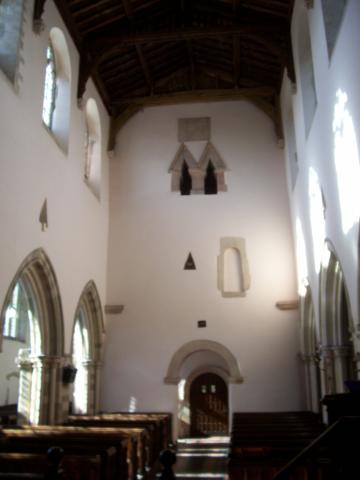MIRACLES AT BARKING ABBEY: A LIGHT FROM HEAVEN
Bede's source for this and the following chapters is a lost libellus, a small book about Æthelburh and the miracles at Barking Abbey, commissioned (or possibly written) by Hildeleth, Æthelburh's successor as abbess of Barking. In the Middle Ages Barking Abbey was a center of literary culture. Aldhelm (ca. 639–709) addresses his prose work Dē virginitāte to Hildeleth, and testifies to the learning and eloquence of the nuns of Barking.
(1) plūra: “many” (LS, multus II.B.2)
signa virtūtum: “signs and miracles,” or “miraculous signs”; see DMLBS, signum 13.d = “miracles”; virtus 7 = “manifested divine power, miracle”; and above, 4.6.3, caelestium signa virtūtum.
sunt … patrāta: = patrāta sunt (“were accomplished”)
quae ... ab hīs quī nōvēre dēscrīpta habentur ā multīs: “which are possessed by many people (in manuscripts) transcribed by those who were acquainted with them.” See DMLBS, describere 2 = “transcribe.” nōvēre > nosco.
aliqua: neuter accusative plural, “a few” signa, direct object of īnserere
historiae nostrae ecclēsiasticae: datives after the compound verb īnserere (“to insert into”)
(2) In a long and complex sentence Bede sets the scene for the miracle he is about to describe (see articulated text).
saepe dictae clādis: “the frequently mentioned plague.” Bede first mentions the severe outbreak of plague in 664 AD at 3.27.
partem monastēriī … quā virī tenēbantur: “the part of this monastery where men were dwelling”; Barking was a double monastery.
raperentur: the subject is virī.
sollicita … quā horā … tangeret: sollicita introduces an indirect question (“worried about at what hour…); re-order: māter congregātiōnis, sollicita quā horā eadem plāga tangeret etiam eam partem monastēriī quā caterva ancellārum Deī erat sēcrēta ā contuberniō virōrum… (see articulated text).
congregātiōnis: “community”
ā virōrum erat sēcrēta contuberniō: “far from the habitation of the men” (DMLBS secretus 4, contubernium 3).
plāga: affliction, disaster, plague
quō locī: “in what place.” locī is a partitive genitive (AG 346.3); the construction is, again, an indirect question, introduced by perquīrere.
eās … raptārī: accusative-infinitive construction after contingeret: “when it happened that they were carried off…” raptārī goes with both eās and cēterōs (“carried off by the same catastrophe by which others [were carried off]…”)
(3) supernae prōvīsiōnis: “of divine providence” (Colgrave-Mynors)
(4) mātūtīnae laudis: literally, “of early morning praise”; referring to the daily office of lauds (also known as matins, from mātūtīna) which was performed at dawn.
ōrātōriō: room for prayer, chapel
velutī linteum magnum: “like a great white sheet.” The description of the vision echoes Peter's vision in Acts 10:11, in which God sanctions the conversion of the Gentiles and a sort of great sail cloth descends from the sky: et videt caelum apertum et dēscendēns vās (“thing”) qūoddam velut linteum magnum quattuor initiīs submittī dē caelō in terram (Vulgate).
tantōque … ut: result clause
(5) Another long, complex sentence describes the miracle and its significance. See articulated text.
in cuius conparātiōne: “in comparison to which”
vidērī posset: “could seem”
nōn multō post: “not much later”; ablative of degree of difference (AG 414)
illō … dē locō: = dē illō locō
in merīdiānum: “to the south”
ea loca operiēns: “covering that area (in light)”
sīc … ut: “in such a way that”
videntibus cūnctīs: ablative of separation (AG 401) after the verb subdūxit: “withdrew itself from all those watching”
ad caelī … alta: “into the depths of heaven”
nūllī esset dubium quīn: AG 558.a
quae animas … in caelīs: the antecedent of quae is lux; re-order: [lux] quae ductūra vel susceptūra esset animās famulārum Chrīstī in caelīs… (see articulated text).
etiam corporibus … mōnstrāret: locum the direct object of mōnstrāret; corporibus can be taken as a dative of purpose (“a place for their bodies”; see AG 383).
in quō … expectātūra: amplifying locum; the subject of requiētūra [essent] and expectātūra essent is corpora (implied by corporibus): “the place in which they [i.e., their bodies]…”
(6) positus fuerat: shifted pluperfect, for positus erat
referret: subjunctive in the result clause following tantus…ut…
quod: “that,” in indirect discourse, introduced by referret, looking forward to vidērentur.
per rīmās ōstiōrum vel fenestrārum: vel = "and": the light was coming in through the doors (ōstia) and windows (fenestrae). Windows in Anglo-Saxon churches were high in the wall of the church, and usually without glass. A good surviving example of the interior of an Anglo-Saxon church is St. Mary's, Deerhurst.
ingressī … fulgōrem: re-order: radiī lūcis, ingressī per rīmās ōstiōrum vel fenestrārum, vidērentur superāre omnem fulgōrem diurnī lūminis.

